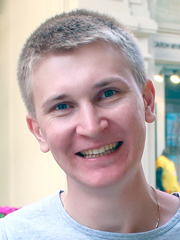27002102
Тренировка навыка транскрибирования
Beschreibung
Keine Merkmale angegeben
Quiz von Artem Glushko, aktualisiert more than 1 year ago
Mehr
Weniger

|
Erstellt von Artem Glushko
vor etwa 4 Jahre
|
|
Zusammenfassung der Ressource
Frage 1
Frage
In the mountains [blank_start]['maʊntɪnz][blank_end] you can see amazing [blank_start][ə'meɪzɪŋ][blank_end] animals [blank_start]['ænɪməlz][blank_end]. Golden [blank_start]['ɡəʊldən][blank_end] eagles [blank_start]['iːgəlz][blank_end] live in the mountains in Asia [blank_start]['eɪʒə][blank_end], North America [blank_start][nɔːθ ə'merɪkə][blank_end], Africa [blank_start]['æfrɪkə][blank_end] and Europe [blank_start]['juərəp][blank_end]. They make nests [blank_start][nests][blank_end] on high [blank_start][haɪ][blank_end] rocks. Golden eagles have big wings [blank_start][wɪŋz][blank_end]. They can fly very [blank_start]['verɪ][blank_end] high. They can see very well, too [blank_start][tuː][blank_end]. They eat small animals. From high in the sky they can see small [blank_start][smɔːl][blank_end] animals on the ground [blank_start][graʊnd][blank_end].
Many [blank_start]['menɪ][blank_end] mountain animals have thick [blank_start][θɪk][blank_end] fur. Their fur [blank_start][fɜː][blank_end] helps them to stay warm [blank_start][wɔːm][blank_end]. Snow [blank_start][snəʊ][blank_end] leopards [blank_start]['lepədz][blank_end] live in the mountains in Asia. They have big paws [blank_start][pɔːz][blank_end] with lots of fur. This fur helps them to walk [blank_start][wɔːk][blank_end] on snow and ice [blank_start][aɪs][blank_end].
Antworten
-
['maʊntɪnz]
-
[ə'meɪzɪŋ]
-
['ænɪməlz]
-
['ɡəʊldən]
-
['iːgəlz]
-
['eɪʒə]
-
[nɔːθ ə'merɪkə]
-
['æfrɪkə]
-
['juərəp]
-
[nests]
-
[haɪ]
-
[wɪŋz]
-
['verɪ]
-
[tuː]
-
[smɔːl]
-
[graʊnd]
-
['menɪ]
-
[θɪk]
-
[fɜː]
-
[wɔːm]
-
[snəʊ]
-
['lepədz]
-
[pɔːz]
-
[wɔːk]
-
[aɪs]
Frage 2
Frage
Do you like noodles [blank_start]['nuːdlz][blank_end] or chocolate [blank_start]['tʃɒklət][blank_end]? Do you know how people [blank_start]['piːpəl][blank_end] make this food [blank_start][fuːd][blank_end]? People make noodles from grains [blank_start][ɡreɪnz][blank_end] like rice or wheat [blank_start][wiːt][blank_end]. To make rice noodles, people grind [blank_start][ɡraɪnd][blank_end] rice into flour [blank_start][flaʊə][blank_end]. Then they mix [blank_start][mɪks][blank_end] flour with [blank_start][wɪð][blank_end] water [blank_start][wɔːtə][blank_end] to make dough [blank_start][dəʊ][blank_end]. In factories [blank_start]['fæktərɪz][blank_end], machines [blank_start][mə'ʃiːnz][blank_end] push [blank_start][pʊʃ][blank_end] dough through [blank_start][θruː][blank_end] holes [blank_start][həʊlz][blank_end] to make noodles. Some people make noodles by hand [blank_start][hænd][blank_end]. They pull [blank_start][pʊl][blank_end] the dough between [blank_start][bɪ'twiːn][blank_end] their fingers [blank_start]['fɪŋɡəz][blank_end].
To make chocolate, people take seed [blank_start][siːd][blank_end] pods [blank_start][pɔdz][blank_end] from cacao [blank_start][kə'kaʊ][blank_end] trees and leave [blank_start][li:v][blank_end] them in the sun [blank_start][sʌn][blank_end]. Then [blank_start][ðen][blank_end] they throw [blank_start][θrəʊ][blank_end] away the outside and keep the seeds. Machines grind and heat [blank_start][hi:t][blank_end] the seeds, and then the seeds become a liquid [blank_start]['lɪkwɪd][blank_end]. Then people cook [blank_start][kʊk][blank_end] this liquid with sugar [blank_start]['ʃʊɡə][blank_end] and sometimes milk. They put the liquid in molds [blank_start][məʊldz][blank_end] to make chocolate bars [blank_start][ba:z][blank_end].
Audio:
Noodles (audio/mpeg)
Antworten
-
['nuːdlz]
-
['tʃɒklət]
-
['piːpəl]
-
[fuːd]
-
[ɡreɪnz]
-
[wiːt]
-
[ɡraɪnd]
-
[flaʊə]
-
[mɪks]
-
[wɪð]
-
[wɔːtə]
-
[dəʊ]
-
['fæktərɪz]
-
[mə'ʃiːnz]
-
[pʊʃ]
-
[θruː]
-
[həʊlz]
-
[hænd]
-
[pʊl]
-
[bɪ'twiːn]
-
['fɪŋɡəz]
-
[siːd]
-
[pɔdz]
-
[kə'kaʊ]
-
[li:v]
-
[sʌn]
-
[ðen]
-
[θrəʊ]
-
[hi:t]
-
['lɪkwɪd]
-
[kʊk]
-
['ʃʊɡə]
-
[məʊldz]
-
[ba:z]
Frage 3
Frage
You breathe [blank_start][briːð][blank_end] through [blank_start][θruː][blank_end] your nose [blank_start][nəʊz][blank_end] and mouth [blank_start][maʊθ][blank_end]. Your nose and mouth take air [blank_start][eə][blank_end] into your body [blank_start]['bɒdɪ][blank_end]. You breathe about 15 times every [blank_start]['evrɪ][blank_end] minute [blank_start]['mɪnɪt][blank_end]. After exercise [blank_start]['eksəsaɪz][blank_end], people breathe fast. They can breathe 40 times every minute! Your nose helps you to smell things [blank_start][θɪŋz][blank_end]. Your mouth helps you to talk [blank_start][tɔːk][blank_end] and eat. Your teeth [blank_start][tiːθ][blank_end] bite [blank_start][baɪt][blank_end] food so you can eat [blank_start][iːt][blank_end] it [blank_start][ɪt][blank_end]. Your body uses [blank_start]['juːzɪz][blank_end] food to live and grow. Protect [blank_start][prə'tekt][blank_end] your teeth! Brush [blank_start][brʌʃ][blank_end] your [blank_start][jɔː][blank_end] teeth after breakfast [blank_start]['brekfəst][blank_end] and after dinner, and don't eat lot's of candy [blank_start]['kændɪ][blank_end].
Audio:
Nose And Mouth (audio/mpeg)
Antworten
-
[briːð]
-
[θruː]
-
[nəʊz]
-
[maʊθ]
-
[eə]
-
['bɒdɪ]
-
['evrɪ]
-
['mɪnɪt]
-
['eksəsaɪz]
-
[θɪŋz]
-
[tɔːk]
-
[tiːθ]
-
[baɪt]
-
[iːt]
-
[ɪt]
-
['juːzɪz]
-
[prə'tekt]
-
[brʌʃ]
-
[jɔː]
-
['brekfəst]
-
['kændɪ]
Möchten Sie mit GoConqr kostenlos Ihre eigenen Quiz erstellen? eigenen Mehr erfahren.
